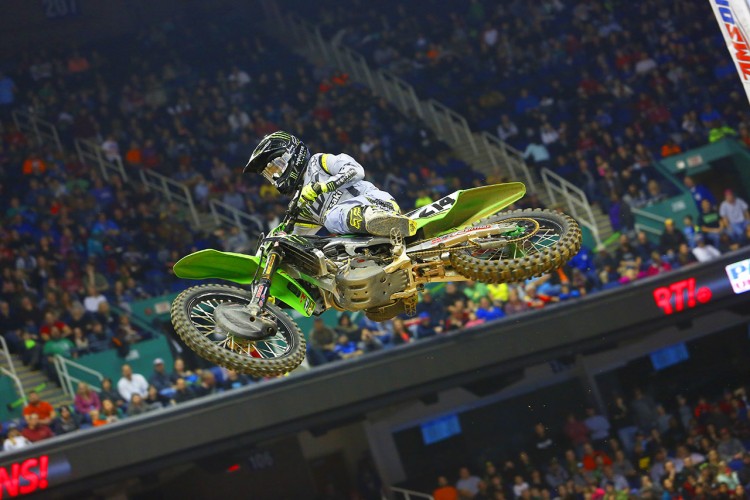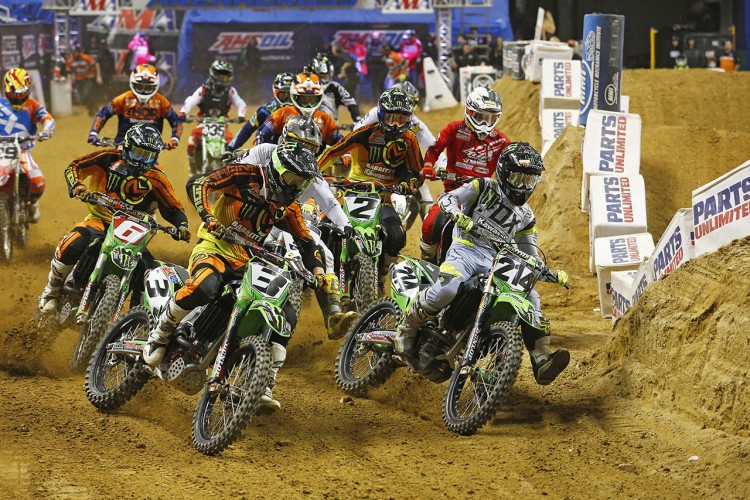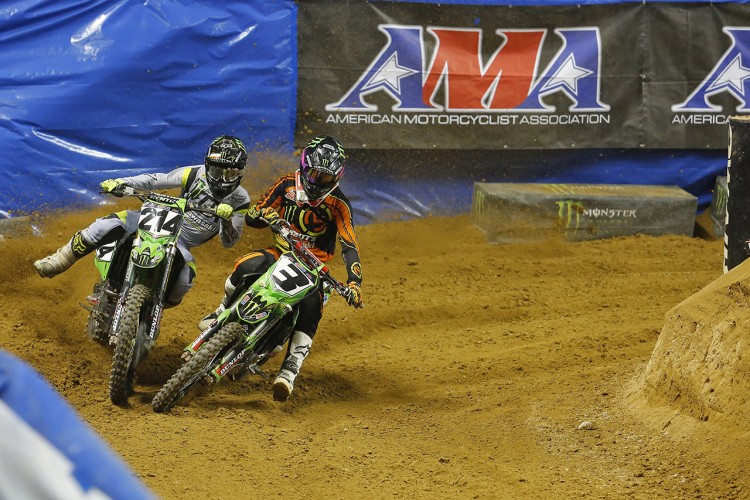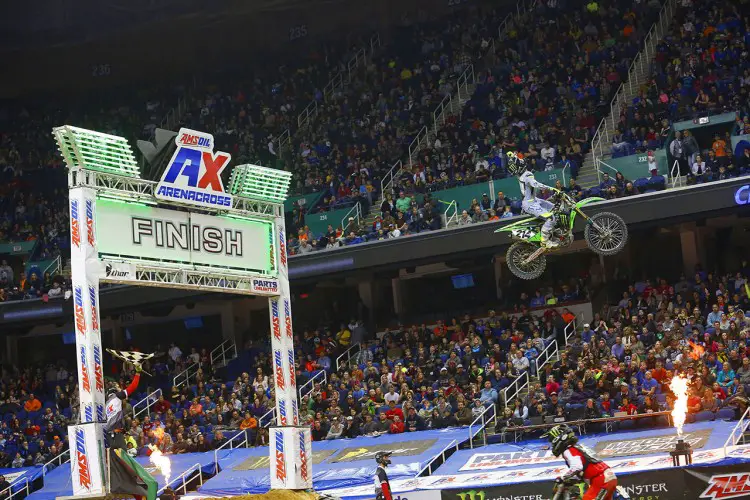INTERVIEW OF THE WEEK: AUSTIN FORKNER
 Pro Circuit Kawasaki’s Austin Forkner has arrived. The Missouri native made waves two weekends ago by winning both main events at the Greensboro round of the Amsoil Arenacross series. His perfect evening captivated a collective audience previously unaware of Forkner’s abilities in the tight confines of Arenacross. Heck, Austin seemed a bit surprised in winning the overall. When asked what his plans were following the night’s good fortune, Forkner said that he would take the rest of the weekend off and begin his grueling training regiment again on Tuesday. So while Austin beat out established stars and veterans of the bull ring, it was business as usual for the unassuming teen.
Pro Circuit Kawasaki’s Austin Forkner has arrived. The Missouri native made waves two weekends ago by winning both main events at the Greensboro round of the Amsoil Arenacross series. His perfect evening captivated a collective audience previously unaware of Forkner’s abilities in the tight confines of Arenacross. Heck, Austin seemed a bit surprised in winning the overall. When asked what his plans were following the night’s good fortune, Forkner said that he would take the rest of the weekend off and begin his grueling training regiment again on Tuesday. So while Austin beat out established stars and veterans of the bull ring, it was business as usual for the unassuming teen.
What I like about Austin Forkner is that he comes from a family of hard workers who are unpretentious and simply thankful to be given the ability to live comfortably. It’s obvious that Austin takes his racing career seriously, evidenced by his answers to my questions. He’s the real deal, ladies and gents. Meet Austin Forkner.
Interview and photos by John Basher
 Austin Forkner (214) proved that he’s a good starter at the Greensboro Arenacross. Great starts helped propel him to two main event victories in a series that he’s now moved on from.
Austin Forkner (214) proved that he’s a good starter at the Greensboro Arenacross. Great starts helped propel him to two main event victories in a series that he’s now moved on from.
You’re from Missouri, which is known for being rural. Is it true you grew up around a farm? My grandparents own a farm. They’ve owned it for a long time. They have cows and pigs. My dad does the farming, as far as crops go, with the tractors and combines. He plants corn, wheat, beans and other vegetables. He grinds up the corn to feed to the hogs. They sell the wheat and beans. We usually have fresh meat, because there are a lot of cows and pigs. That’s definitely a good part about it. I’ve helped my dad with driving tractors and the combines. My uncle takes care of the pigs, and he has a few hired hands to help him. My grandpa is the leader of the cattle. He’s the guy who oversees everything that goes on, but he’s in charge of the cows. I’ve always lived close to the family farm. It’s good, because I get to spend a lot of time with my family. I like living out in the country. I can do pretty much whatever I want. There’s a town about 15 minutes away where I go to the gym. There’s a Wal-Mart and some restaurants.
What does your mother do? She’s an elementary school teacher. She teaches kindergarten. My mom is close to retiring. I would always ride with her to school. I went to school a couple of years longer than a normal school would have let me, because she knew all of my teachers. I was allowed to miss some school, because they knew that I was racing around the country. My teachers would assign me homework, and I was able to keep up. When I switched to home schooling I was able to use the same books as the kids in my grade.
Did you ever dream of being where you are now? When I was five or six years old I went to my first Amateur National and got a feel of what real motocross was like. Up to that point I had ridden around in the front yard and went to a few local races. When I went to Ponca City I got a top ten and realized how big motocross was. The next year I qualified for Loretta’s, and that kick started everything. From that point on the goal was to get a ride and race professionally.
How were you able to realize at such a young age that you were cut out to be a professional racer? Most kids that age don’t even know what they want for breakfast. It wasn’t until I won two classes at Loretta’s in 2010 that I said to myself, ‘Okay, this is probably what I’m going to do for a living.’ I was picked up by Team Green and things moved quickly. Before that I was just racing for fun. When I was really young I had the goal of racing professionally, but I didn’t think about it very much. Once I got a Team Green ride, they expected me to do well. They were giving me free bikes and paying me, so I had to do them proud. I’ve been on Kawasaki’s ever since then, and I’ll be on them until I’m probably done racing the 250 class.
 Gavin Faith (3) gave Austin Forkner a king nudge as a welcoming present to the Pro ranks. Forkner, however, overcame the hazing ritual to win the overall.
Gavin Faith (3) gave Austin Forkner a king nudge as a welcoming present to the Pro ranks. Forkner, however, overcame the hazing ritual to win the overall.
What did you change in your riding and training program when you decided to actively pursue a racing career? My training didn’t change very much when I was on little bikes. Once I moved to the big bike I upped my program, because the bike is heavier and the competition is faster. I would ride whenever I could during the week and usually ride every weekend. We traveled to places like Texas in the winter, and also California. If I did well at the Nationals I was excited, but after I signed a deal I told myself that I needed to do good at the Nationals. So that part changed a little bit. I actually didn’t realize the factories were looking at me until I was in the Supermini class. Then we started getting some phone calls and began talking to people. Pro offers started coming in, and it opened my eyes. I needed to do really good so I could get the best Pro contract possible. That opened up opportunities. I did well on Superminis and had a full year on Team Green before I could sign with any Pro team. I needed to do good in the B Class, because all of the teams were waiting to see if I could ride a 250 like I had ridden the Supermini. I won quite a bit this year in the B Class and Schoolboy Class, including at Loretta’s and Mini O’s. Things have been good.
When did you sign a deal with Pro Circuit Kawasaki? I signed the contract right after I won two titles at Loretta Lynn’s. My contract with Team Green was up, so I signed with Pro Circuit Kawasaki. I spoke with Mitch [Payton], and things went well. Then I moved up to the A Class for Mini Olympics and the Monster Cup.
Were you intimidated when you first met Mitch Payton? I first met him when I was on Supermini’s. We flew out to California to meet Mitch, because I was going to run Pro Circuit on the big bike. At first I was intimidated by him, but since then I’ve stayed at his house a bunch when I was testing in California. Now we’re pretty good friends. He can be serious when it’s race time, but he’s really cool when we’re chilling out at his house.
“I LIKE TO GET OUT FRONT AND PUT DOWN HARD SPRINT LAPS AT THE BEGINNING. FROM THERE I TRY TO CONTROL THE REST OF THE RACE. THAT’S WHAT SEPARATES ME RIGHT NOW, AND I’LL SEE WHAT IT TAKES TO SEPARATE ME AGAIN WHEN I RACE THE AMA NATIONALS.”
You’re obviously fast, there’s no doubt about that. What separates you from everyone else? I’ve always been a better racer than practice rider. Some guys will show up and kill it in practice, whereas I’ll be there, but just not as fast. I don’t stand out when I’m practicing during the week, or sometimes when I’m doing some events that don’t matter very much. Then when it comes time for the Amateur Nationals I go for it and race with a lot more intensity than I practice with. I’ve been working on practicing with more intensity, but it’s hard. I would say that I’ve just always been a really good racer. I don’t know why, but I do something different in the race. I also can get good starts. I like to get out front and put down hard sprint laps at the beginning. From there I try to control the rest of the race. That’s what separates me right now, and I’ll see what it takes to separate me again when I race the AMA Nationals.
 Forkner was ecstatic after going 1-1 on the evening in Greensboro. It was an achievement that even the young prodigy didn’t know would happen so easily.
Forkner was ecstatic after going 1-1 on the evening in Greensboro. It was an achievement that even the young prodigy didn’t know would happen so easily.
Ricky Carmichael preaches about riding hard during the week and not putting in “junk laps,” as he calls them. What’s it like working with Carmichael and his trainer, Clint Friesen? It’s good. I really like Clint and everything we do off the bike. He’s mainly my trainer off the bike. We do cardio, swim, play racquetball, and build strength. Ricky and his mom, Jeannie, have been helping me with on-the-bike training. It’s an intense schedule. Whenever I put in laps I’m on the stopwatch. It’s work, and I’ve been getting better at practicing. Hopefully that will help me carry more intensity into the races, and ride with more intensity for longer when I’m racing.
What have people told you about lining up to the gate for your first AMA National? I’ve heard that the first couple laps are really chaotic, just because everyone is going for it. Then it mellows out after a few laps. At that point it’s apparently pretty normal. I understand why the guys would be aggressive in the first couple of laps, because riders will be bunched up and you’re able to make the most passes. Then guys start stringing out. I need to throw down in the first few laps, get through the aggressive riding, and stay strong for the entire 30 minutes plus two lap moto.
Testing is instrumental in speed progression and having success on the racetrack. Are you good at testing? I have gotten better at testing. When I was young we would start out with a base setting, and then I’d run it for quite a while. You have to test so much more on big bikes, because there are so many different options and ways to make things better. I have gotten a lot better at being able to describe what I do and don’t like about my bike. I know what will happen if I put too much or too little pressure in my forks. We can usually get a good setup in just a few days of testing with Bones Bacon, Adam Walters at Showa, and my mechanic, Ollie [Oliver Stone]. I’m actually getting ready to go to California to get a good base setup that I’ll ride with all of the way up to Hangtown. Then I’ll go out to California again a few weeks before the opener and make a few tweaks to the bike.
Are you picky about anything on the bike? I’m very particular about the front end feel of my bike. I hate it when the front end tucks because the forks are too soft or too high in the clamps. The heavier that I get and the more speed I pick up, we’re having to go stiffer on the front and rear. I’m going faster into the corners and putting more weight on the suspension. We’ll probably keep going stiffer on my suspension as my career continues, because most likely I’ll be going a little bit faster every year.
“I’VE BEEN PAYING REALLY CLOSE ATTENTION TO EVERYONE THIS SUPERCROSS SEASON. I LOOK TO SEE WHAT GUYS LIKE DUNGEY AND WEBB ARE DOING DIFFERENTLY. IT’S HARD, THOUGH, BECAUSE EVERYONE LOOKS FAST.”
Is it hard to keep finding speed and progressing at the level you’re at? Yes. It’s really hard now, especially when there’s a guy that’s just plain faster than me. I ask other people what I need to do to pass him, and it’s hard to figure out. I think that’s where Ricky [Carmichael] can help me out. He’s really good at watching guys on the track. I’ve been paying really close attention to everyone this Supercross season. I look to see what guys like Dungey and Webb are doing differently. It’s hard, though, because everybody looks fast.
What do you think about Arenacross? It’s intense and aggressive racing. It’s tight. Supercross is a bit more open and obviously the stadium is bigger, and that’s why Arenacross is so tough. You have to try not to rush things during the race and stay low in the turns. The other big thing is getting through the whoops consistently. If you can get a good start and get through the whoops every lap then most of the time you’re going to be tough to beat. I’m small, so it’s hard for me in the whoops. I have been spending a lot of time on my technique in the whoops and have gotten better in the past couple weeks.
Do you like the idea of having to earn points in Arenacross to earn a Supercross license? I think it’s good. Some guys that used to ride Supercross didn’t need to be out on the track. They didn’t come prepared and so they didn’t know what they were getting into. With Arenacross you can get the experience. It’s not full Supercross, but you’re racing with Pro guys. The atmosphere is smaller, but you’re still in front of fans. There are jumps, whoops, berms, and everything else. Arenacross is somewhat like Supercross. If you can race with the guys in Arenacross then you get points and show that you are ready to ride Supercross. It makes sense to me.
The “Next Big Thing” label has been handed down through generations. You’re the newest member of that prestigious group. Is there any pressure that comes with having that label? I have a little bit of pressure on me, because everyone expects me to win every race. For Arenacross I wasn’t worried about winning. I wanted to get my points and get experience. My main focus this year is racing the AMA Nationals. Now that I got my points and have a few months before the Nationals start, I’ll race at Freestone and Daytona to do the Spring Nationals. From there it’s straight to Hangtown.
Good luck to you, Austin, and thanks for your time. I appreciate it. I’ll see you at Hangtown!





Comments are closed.